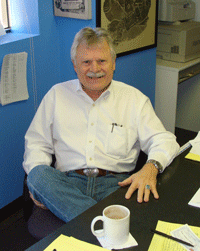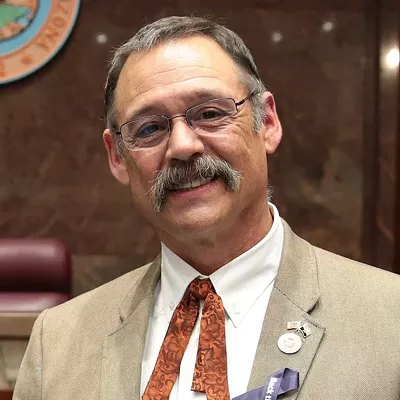It's been more than a year since Risner first filed a records request with Pima County on behalf of the Pima County Democratic Party.
But the Pima County's Election Division said no to the request, for the election database files from the 2006 primary, general and Regional Transportation Authority elections. The result was a four-day trial last month.
When Judge Michael Miller ruled on Dec. 18 that the party could have the 2006 primary- and general-election files, Risner says he and fellow election-integrity activists thought it marked an end to the wrangling and pleading. However, that same day, county officials said the files would not be released until the Board of Supervisors' next meeting on Jan. 8. At that meeting, the board is slated to discuss whether the county should appeal or release the files as ordered by Miller.
Three days after Miller's ruling, the Pima County Attorney's Office filed a notice of appeal and a motion to stay the release of the database files.
Once again, Risner says, the county is using the excuse that allowing the release of the database files could jeopardize future elections by helping outside hackers figure out how to enter the system.
"It's like they're thinking, 'I don't let my kid outside alone because of the chupacabras,' even if they haven't seen them," Risner says.
Risner says the county's reasoning is unfounded. Testimony provided during the trial clearly showed that "there's been no recorded attempt anywhere in the U.S. for someone on the outside attempting to hack into an election system. Think of the entire (list of) counties in all of the states--it's never happened. It can't happen if they don't have access to the computer."
In Miller's findings of fact and conclusion, which Risner plans to appeal, the judge states the county's concerns are plausible.
"Yet ... we can fill a library of books of insiders attempting to cheat in the history of this country," Risner says.
Now, Risner says he and other election-integrity activists are left scratching their heads wondering why: why the county didn't follow the judge's order, why the county filed an appeal only three days after the ruling, and why public-records law continues to hang in the balance, only to be determined at a Jan. 8 Board of Supervisors meeting.
Legally, the county has 30 days to file an appeal and could have done so right after the Jan. 8 meeting, but according to County Attorney Christopher Straub, the county had to file a stay and an appeal right after Miller's ruling in order to prevent the release of the records and "preserve the board's options."
Miller's ruling demanded the records be turned over to the Democratic Party right away, but the supervisors' last meeting of the year was Dec. 18, leaving the supervisors no time to discuss its options, Straub says.
"The board will ultimately decide to go forward or not go forward with any appeal. We don't presume to speak for the board," Straub says.
Risner says he thinks the county is stalling for political purposes.
"I think it's important to look at what the Board of Supervisors thinks is important, and they are all up for re-election this year. They've stalled giving us these documents for over a year. They have now filed a stay that can keep the information out of our hands for another year past the election," Risner says. "That is ultimately what they want to do."
Richard Elias, a Democrat and chairman of the Board of Supervisors, says he knows people are nervous about elections security in Pima County. Elias says he expects the board to make a final decision at the Jan. 8 meeting, although he hasn't seen a report or an agenda.
Risner says the longer the board and the county wait to release the records, the more people are going to ask: "What are they hiding, and what are they doing?"
According to John Brakey, a member of the party's Election Integrity Committee, he and fellow integrity activist Jim March feel the 2006 primary- and general-election files may indeed show signs of tampering. Brakey uses the 2006 District 28 state Senate primary as a possibility.
Then-District 28 Rep. Ted Downing was running for the state Senate against fellow Democrat Paula Aboud. Downing was known to frustrate Secretary of State Jan Brewer, as well as the GOP, the development community and even his fellow Democrats.
Brakey says that several days before the election, a robo-call went out sponsored by the GOP, painting an ugly picture of Downing and telling residents to vote for Aboud. He and others suspect the Elections Division may have illegally printed an election summary of early ballots showing that Downing was ahead the day before the election. Between that, the robo-call and the fact that a port on the elections machines was used, Brakey says it all seems suspicious.
"Downing was the first person to introduce major statewide election-reform legislation allowing for hand counts. He was a major election-integrity activist, and he was critical of Rio Nuevo," Brakey says. "He wasn't liked for that, and they wanted him out."
Downing, who works as an investigator for the World Bank when he's not teaching at the UA, says he's not comfortable thinking that election fraud may have been the reason he was not elected to the state Senate.
"What does bother me is that it was the first time robo-calls were used in Tucson. I got a taste of how those calls can be abused," Downing says.
The calls started the Saturday night and Sunday morning before the election. On Monday, he received funds to do a promotional call using the robo-call system, but he decided against it--though he did learn how easy it is to record a robo-call and send it off to 100,000 voters an hour, for just 6 cents per call.
Brakey says the database files may be a Pandora's Box the county doesn't want opened.
"Here we are, back where we started, right in front of the supervisors all over again," Brakey says. "We'll be filling the meeting. They can't ignore us."












